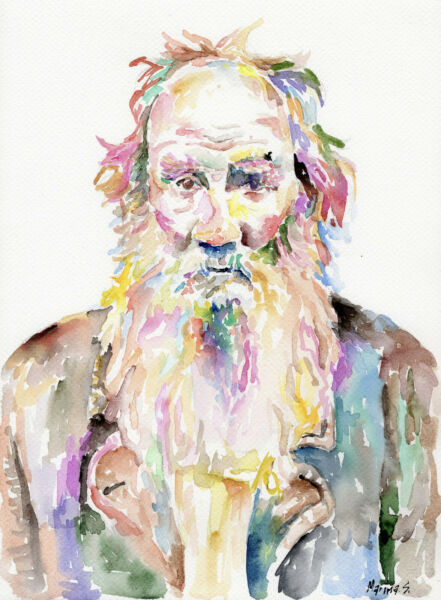Leo Tolstoy Archive
Written: 1904
Source: "Fables for Children," by Leo Tolstoy, translated from the original Russian and edited by leo Wiener, assistant Professor of Slavic Languages at Harvard University, published by Dana Estese Company, Boston, Edition De Luxe, limited to one thousand copies of which this is no. 411, copyright 1904, electrotyped and printed by C. H. Simonds and Co., Boston, Massachusetts, USA.
Transcription/Markup: Andy Carloff
Online Source: RevoltLib.com; 2021

When I left the Caucasus, they were still fighting there, and in the night it was dangerous to travel without a guard.
I wanted to leave as early as possible, and so did not lie down to sleep.
My friend came to see me off, and we sat the whole evening and night in the village street, in front of my cabin.
It was a moonlit night with a mist, and so bright that one could read, though the moon was not to be seen.
In the middle of the night we suddenly heard a pig squealing in the yard across the street. One of us cried: "A wolf is choking the pig!"
I ran into the house, grasped a loaded gun, and ran into the street. They were all standing at the gate of the yard where the pig was squealing, and cried to me: "Here!" Milton rushed after me,—no doubt he thought that I was going out to hunt with the gun; but Búlka pricked his short ears, and tossed from side to side, as though to ask me whom he was to clutch. When I ran up to the wicker fence, I saw a beast running straight toward me from the other side of the yard. That was the wolf. He ran up to the fence and jumped on it. I stepped aside and fixed my gun. The moment the wolf jumped down from the fence to my side, I aimed, almost touching him with the gun, and pulled the trigger; but my gun made "Click" and did not go off. The Wolf did not stop, but ran across the street.
Milton and Búlka made for him. Milton was near to the wolf, but was afraid to take hold of him; and no matter how fast Búlka ran on his short legs, he could not keep up with him. We ran as fast as we could after the wolf, but both the wolf and the dogs disappeared from sight. Only at the ditch, at the end of the village, did we hear a low barking and whimpering, and saw the dust rise in the mist of the moon and the dogs busy with the wolf. When we ran up to the ditch, the wolf was no longer there, and both dogs returned to us with raised tails and angry faces. Búlka snarled and pushed me with his head: evidently he wanted to tell me something, but did not know how.
We examined the dogs, and found a small wound on Búlka's head. He had evidently caught up with the wolf before he got to the ditch, but had not had a chance to get hold of him, while the wolf snapped at him and ran away. It was a small wound, so there was no danger.
We returned to the cabin, and sat down and talked about what had happened. I was angry because the gun had missed fire, and thought of how the wolf would have remained on the spot, if the gun had shot. My friend wondered how the wolf could have crept into the yard. An old Cossack said that there was nothing remarkable about it, because that was not a wolf, but a witch who had charmed my gun. Thus we sat and kept talking. Suddenly the dogs darted off, and we saw the same wolf in the middle of the street; but this time he ran so fast when he heard our shout that the dogs could not catch up with him.
After that the old Cossack was fully convinced that it was not a wolf, but a witch; but I thought that it was a mad wolf, because I had never seen or heard of such a thing as a wolf's coming back toward the people, after it had been driven away.
In any case I poured some powder on Búlka's wound, and set it on fire. The powder flashed up and burned out the sore spot.
I burned out the sore with powder, in order to burn away the poisonous saliva, if it had not yet entered the blood. But if the saliva had already entered the blood, I knew that the blood would carry it through the whole body, and then it would not be possible to cure him.